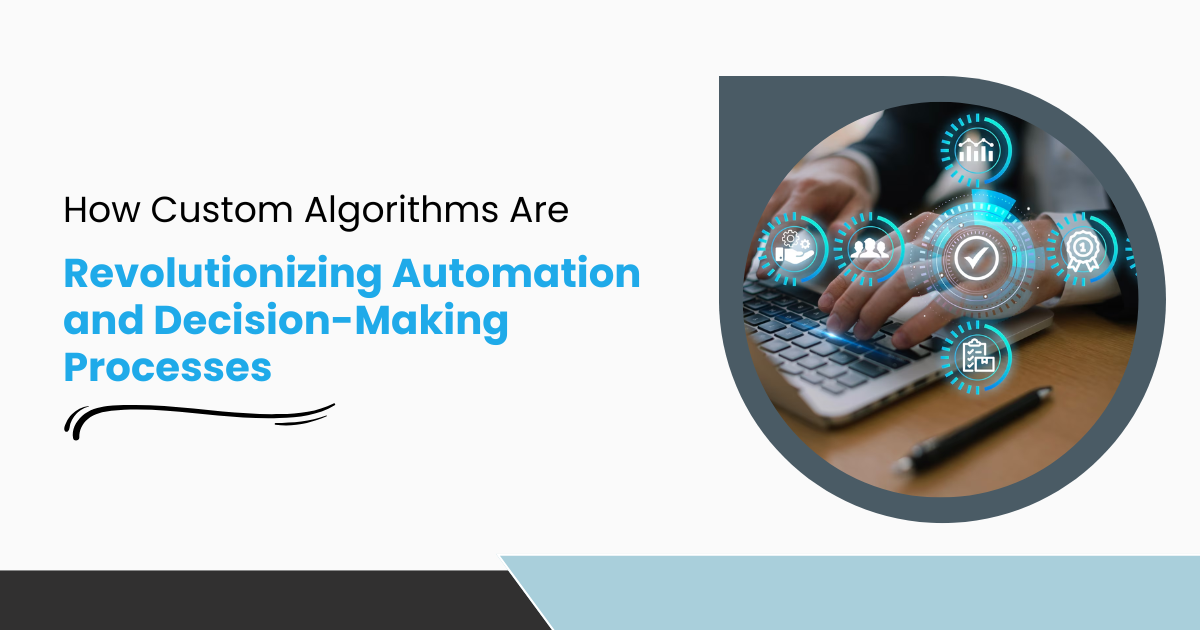science-technology

April 09,2025 • 5 min read
How Custom Algorithms Are Revolutionizing Automation and Decision-Making Processes

In an era driven by data and technological advancements, industries across the globe are increasingly relying on automation and data-driven decision-making to streamline processes and enhance operational efficiency. According to Gartner, by 2025, 70% of enterprises will shift from rule-based decision-making to AI-driven algorithms to improve efficiency. Custom algorithms have become a key component of this transformation, offering tailored solutions optimized for specific business needs. A McKinsey report states that AI-powered automation can boost business productivity by up to 40% and reduce operational costs by 30%. As organizations strive for greater accuracy, faster decision-making, and enhanced productivity, the role of custom algorithms in automation is revolutionizing the way decisions are made. In the financial sector alone, algorithmic trading accounts for over 60% of total trading volume, highlighting the growing reliance on data-driven decision-making. In this article, we will explore how custom algorithms are shaping the future of automation and decision-making across various sectors.
Overview of Automation and Decision-Making
Automation refers to the use of technology to perform tasks that were previously carried out by humans, often involving repetitive and time-consuming processes. Decision-making, on the other hand, involves analyzing data to make informed choices, which has historically been a complex and human-driven process.
With the rise of digital transformation, businesses are looking to replace manual intervention with smart systems that can independently analyze data, detect patterns, and make real-time decisions. This is where custom algorithms come into play, offering solutions that can handle vast amounts of data, learn from it, and make complex decisions without human input.
Role of Custom Algorithms
Custom algorithms are tailored to the unique needs of an organization. Unlike off-the-shelf software solutions, which are general-purpose, custom algorithms are designed to address specific challenges and deliver optimal results. Custom Algo Development Services help businesses create these specialized algorithms, ensuring they align with the company’s goals and processes. These algorithms leverage the power of data, artificial intelligence, and machine learning to automate decision-making processes in ways that were previously unthinkable.
What Are Custom Algorithms?
A custom algorithm is a computational procedure developed specifically for a business to solve a particular problem or improve an existing process. Custom algorithms analyze data, identify trends or patterns, and make decisions based on pre-set logic or learned insights. They can be applied across various industries, such as finance, healthcare, logistics, and e-commerce, to drive smarter business operations.
Why Custom Algorithms Matter for Automation
Custom algorithms are essential for improving automation because they help businesses achieve more with less manual intervention. The following are key reasons why these algorithms are critical to enhancing automation processes:
1. Improved Efficiency
By automating tasks that would typically require human input, custom algorithms significantly reduce the time spent on mundane activities. This allows employees to focus on more strategic tasks, ultimately boosting productivity and operational efficiency.
2. Enhanced Accuracy
Humans are prone to errors, especially when performing repetitive tasks or analyzing vast amounts of data. Custom algorithms, however, can make precise, consistent decisions without fatigue, leading to more accurate outcomes.
3. Real-Time Decision-Making
Custom algorithms allow businesses to make decisions in real-time based on current data, enabling them to respond to market changes, customer needs, or operational issues instantly. This agility is crucial in today’s fast-paced business environment.
Challenges in Developing Custom Algorithms
Custom algorithms are highly valuable because they provide tailored solutions for specific problems, helping businesses optimize their processes, enhance decision-making, and automate tasks. However, developing these algorithms comes with certain challenges that must be carefully managed to ensure the success of the project.
1. Data Quality Issues
Data serves as the foundation of any algorithm. Custom algorithms rely heavily on the quality and accuracy of the data they are fed. Inaccurate, incomplete, or biased data can lead to faulty predictions and poor decision-making. For instance, an algorithm designed to predict customer behavior may produce inaccurate results if the input data contains errors, duplicates, or irrelevant information.
2. Integration Complexity
Custom algorithms often need to be integrated into existing systems, which can be a complex and time-consuming process. These algorithms are frequently part of a broader technological ecosystem, requiring seamless interaction with various software applications, databases, and hardware devices. Integration can be challenging for several reasons:
To mitigate these challenges, thorough planning and a deep understanding of the system’s architecture are essential. Engaging with a development team that is well-versed in system integration will help smooth out the implementation process.
3. Ongoing Maintenance
Custom algorithms are not static; they require ongoing monitoring, fine-tuning, and maintenance to remain effective. External factors such as changes in the data landscape, user behaviors, or market conditions may require adjustments to the algorithm. Additionally, the software environment or integration requirements might evolve, necessitating updates to keep everything runningmoothly.
Conclusion
Custom algorithms are revolutionizing automation and decision-making by providing businesses with the tools to optimize operations, improve accuracy, and respond to dynamic market conditions. As industries increasingly adopt custom algorithm solutions, the potential for innovation and growth becomes limitless. By partnering with the right Custom Algo Development Company, businesses can unlock new opportunities and gain a competitive advantage in the digital age.
George Brown Details
User Profile
- Full name
- George Brown
- Email address
- george.brown.gb986@gmail.com
- Join Date
- 2025-03-26
- State
- California
- City
- Altadena
- Pincode
- Address
- Follow us on Facebook
- https://www.facebook.com/hashstudioz
- Follow us on Twitter
- Website Name
- https://www.hashstudioz.com
- Bio
- I’m a passionate individual with a diverse skill set centered on technology, writing, and software development.